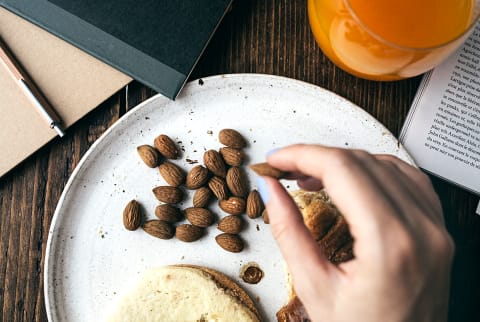Advertisement
Research Reveals How To Snack Healthier For Better Blood Sugar Control


Snacking can be a godsend when you've just powered through a tough workout or hit an afternoon hunger-slump—but other times, snacking can spike your blood sugar, and wind up making you feel worse than before you snacked.
So, what's the healthy snack solution? According to a study out of King's College London, presented at the annual meeting of the American Society for Nutrition, researchers may have found it. Here's what to know.
Studying snacking and its impact on blood sugar
For this study, researchers wanted to look more closely at the connection between snack timing, quantity, and quality, as they related to blood fats and insulin levels.
To do so, they used data from over 1,000 people who'd participated in the ZOE PREDICT 1 study, which focused on how and why people respond differently to the same foods.
And based on their analysis, quality and timing are the two big factors to consider when reaching for a snack. Namely, snacking on higher quality foods (options that are nutrient-dense, as opposed to "empty calories"), was linked with better blood fat and insulin responses.
Further, in terms of timing, snacking during the day is also better for blood sugar levels. Late-night snacking, on the other hand, was associated with less desirable blood sugar and fat levels.
And these findings on snacking were independent from other dietary factors like full meals, which the study authors point out means healthy snacking is one simple, modifiable change people can make to improve their health.
"Our study showed that the quality of snacking is more important than the quantity or frequency of snacking, thus choosing high quality snacks over highly processed snacks is likely beneficial," explains study co-author Kate Bermingham, Ph.D. in a news release, adding, "Timing is also important, with late night snacking being unfavorable for health."
What to do about it
According to Bermingham, snacking accounts for anywhere from 20-25% of our energy intake, so don't underestimate the impact your snacking choices can have on your health.
And based on this study, your best bets are to stick to nutrient-dense snacks during the day, and avoiding snacking after dinner.
"Nutrient-dense" is defined as food having a high vitamin and mineral content in relation to its weight, or calories, so think 250 calories worth of fruit and vegetables, as opposed to 250 calories of potato chips.
Need some inspo? Here's a quick list of some of our favorite nutrient-rich snacks:
- Greek yogurt
- Mixed nuts
- Bananas
- Avocado toast on whole grain or gluten-free bread
- Edamame
- Hard-boiled eggs
- Fruit salad
- Apple slices with almond butter
- Chia pudding
- Kale chips
- Veggies and hummus
- Organic, grass-fed jerky
- Rice cakes with nut butter
- Roasted chickpeas
- Tuna salad and grain-free crackers
- Energy balls
- Dark chocolate
The takeaway
If snacking makes up at least 20% of our overall diet, we want to make sure we're doing it right. And based on this research, for better blood sugar, stick with nutrient-dense snacks earlier on in the day.
